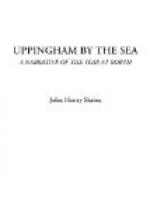Whether it was these purgations, or the fumes of the carbolic which exorcised the infection, or whether the pest was starved out by the immediate and careful isolation of the cases that occurred, we must leave doctors to determine. It is certain that the epidemic came to an end in less than ten days after the first case. That we were able to apply the most necessary of measures, that of isolating at once all cases declared or suspected, we owe to the readiness of the villagers to put house-room at our service, a readiness on which we certainly had no right to calculate. The rent we might pay them was no measure of the service rendered. If a panic had closed their doors, our situation would have been worse than critical.
The cause of the outbreak could not be confidently assigned, but since the most probable theory traced it to a recent railway excursion made by some school parties, these expeditions were discontinued for a time. This was no great privation, for the year was closing in.
About this time, October 16th, the appointment of new “Praepostors” was made, to fill up vacancies in the body. In speaking as usual on the occasion, the Headmaster called attention to the experiment in self-government which our special circumstances were affording. There would be little reason for our recording the occasion, were it not that since that date the monitorial system in public schools has been canvassed in the Press, on occasion of an untoward incident of recent notoriety, and has been described by some as the parent of the “grossest tyranny,” ruinous to the future of any school from which the institution is inseparable. We had thought this view of the system obsolete, or correct only of schools subject to obsolete conditions. If we were mistaken, it may be worth while to record an experience which tends to a less pessimistic conclusion.
It will easily be understood that the mechanical organisation of the school was greatly deranged by the removal from home. The boys of the several houses were no longer locally separated, nor in the same immediate contact with their housemasters; they were restrained by few bolt-and-bar securities, “lock-up” being for the most part impracticable, and were allowed a larger liberty in many less definable ways. At the same time they were exposed to no little discomfort, and during the rainy months to much monotony, the very conditions which promote bullying and other mischief. Further, the same causes which reduced the control of masters, also embarrassed the upper boys in their monitorial duties. Thus the school was left in a quite unusual degree to its self-government, and that government had to act at a disadvantage.
Yet the result was that all went well. The boys did not bully one another, and they gave their masters no sort of trouble. Old rules had to be relaxed, because they could not be enforced, but no licence came of it; new rules had to be made, which might seem vexatious and not very intelligible restrictions, but there was no tendency to break them. Of course wrong things were done at Borth as elsewhere; but if we were to record the few misdeeds which occur to us, their insignificance would provoke a smile; while we have good evidence for the belief that the rate of undetected offences was not increased.




